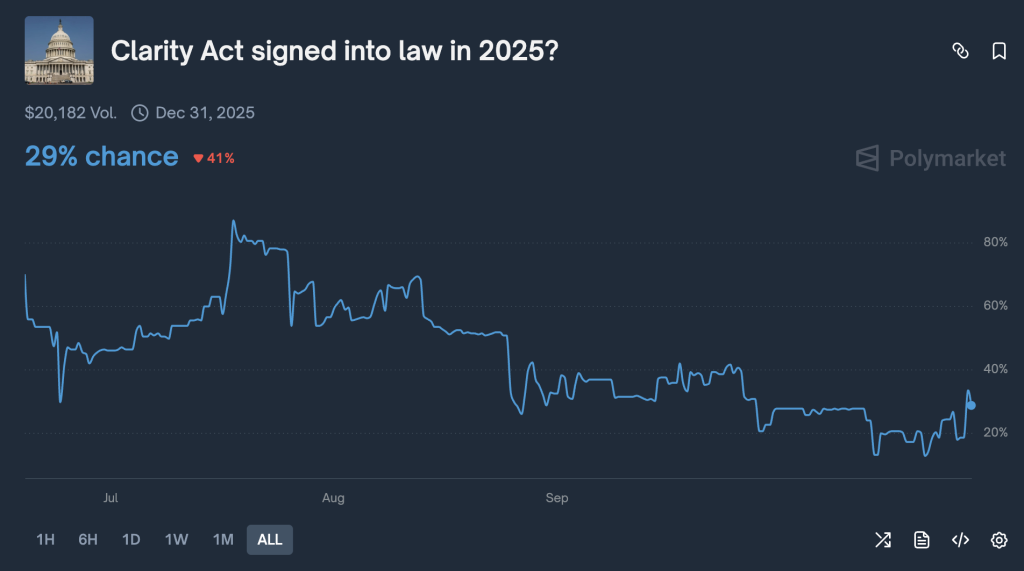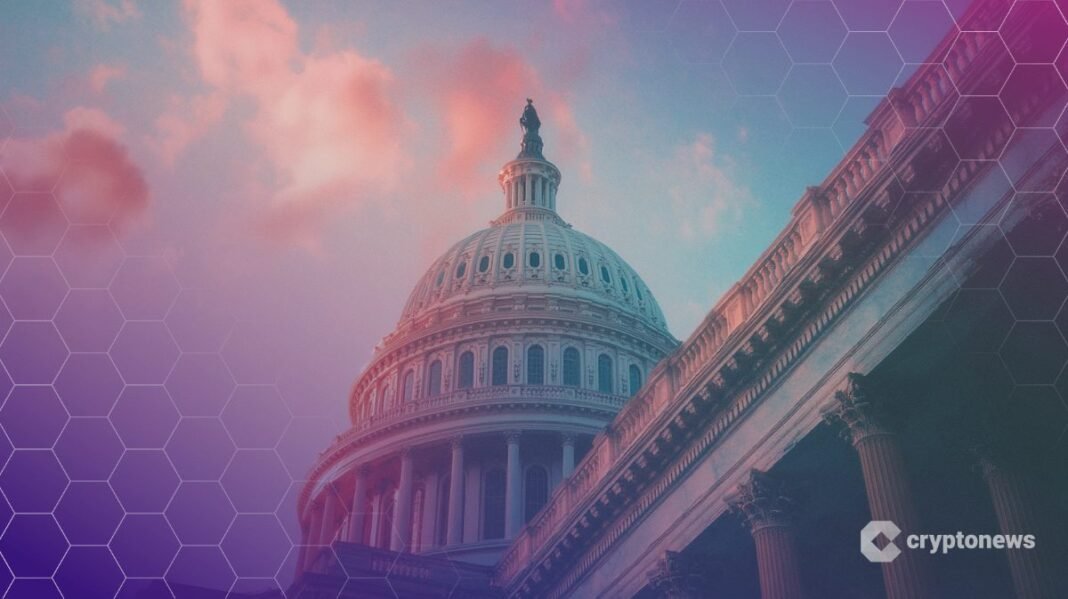North Carolina Senator Thom Tillis has warned that Congress faces a slender window to cross long-awaited cryptocurrency laws, cautioning that political gridlock may kill the hassle early subsequent 12 months.
Chatting with Bloomberg on Monday, the Republican member of the Senate Banking Committee mentioned lawmakers should act “by the primary a part of January, February” to advance the crypto market construction invoice earlier than election politics take over.
“I’m not optimistic about us shifting a lot additional on something round digital property, stablecoins, or crypto on this Congress,” Tillis mentioned, noting that the 2026 midterm elections would doubtless stall progress.
His feedback come as Washington stays paralyzed by a authorities shutdown that started on October 1, triggered by disputes over healthcare funding and subsidy cuts.
The U.S. authorities shutdown will drag on till not less than November 16, Polymarket bettors predict in a brand new ballot.#Polymarket #GovernmentShutdownhttps://t.co/MvTd3lJQSB
— Cryptonews.com (@cryptonews) October 21, 2025
Senate, Home Divide Stalls U.S. Crypto Framework as Shutdown Drags On
Whereas the Senate continues to satisfy, Home Speaker Mike Johnson has delayed most ground enterprise, leaving a number of crypto-related payments, together with the Digital Asset Market Readability Act, or CLARITY Act, in limbo.
The CLARITY Act, handed by the Home of Representatives in July with robust bipartisan assist in a 294–137 vote, seeks to outline which digital property fall underneath the jurisdiction of the Commodity Futures Buying and selling Fee (CFTC) and that are overseen by the Securities and Trade Fee (SEC).
It goals to carry long-needed readability to how digital property are categorised, creating a transparent distinction between decentralized “digital commodities” and extra centralized “restricted digital property.”
The invoice has been a key focus of congressional discussions this 12 months, following the sooner passage of the GENIUS Act, a stablecoin invoice signed into regulation by President Donald Trump in July.
Collectively, the 2 measures symbolize essentially the most complete push but to create a federal framework for the crypto business.
Nonetheless, progress within the Senate has slowed sharply since early October, after a Democratic proposal outlining guidelines for decentralized finance (DeFi) was leaked to the press, drawing backlash from business leaders.
Senate Democrats suggest a Treasury restricted listing for DeFi with KYC on frontends, halting GOP talks as business warns proposal pushes innovation offshore.#Defi #Democrats #USSenatehttps://t.co/s56jqsDts1
— Cryptonews.com (@cryptonews) October 10, 2025
Talks between Republicans and crypto-friendly Democrats have since stalled, with either side preoccupied by the continuing authorities shutdown.
Senator Cynthia Lummis, a number one Republican on the Banking Committee, beforehand mentioned she anticipated the Senate’s model of the invoice, the Accountable Monetary Innovation Act, to turn out to be regulation by 2026.
However Tillis’s remarks present a rising sense of urgency amongst lawmakers who concern the legislative window is closing quick.
Senate Democrats and Republicans are anticipated to satisfy individually with crypto executives this week to revive discussions.
In the meantime, different crypto-related payments, such because the Anti-Central Financial institution Digital Foreign money Surveillance State Act, which might prohibit the Federal Reserve from issuing a retail CBDC, are additionally awaiting Senate consideration.
Consultant Ro Khanna has proposed new laws to ban lawmakers from proudly owning or launching cryptocurrencies following President Trump’s controversial pardon of Binance founder Changpeng Zhao, including additional complexity to Congress’s crypto agenda.
@RepRoKhanna plans to introduce a invoice banning lawmakers from proudly owning or creating cryptocurrencies, following @realDonaldTrump's pardon of CZ.#Crypto #Binancehttps://t.co/r0eJThPuTF
— Cryptonews.com (@cryptonews) October 28, 2025
Bipartisan Crypto Reform Talks Intensify as Lawmakers Push for 12 months-Finish Deal
On October 20, Senator Kirsten Gillibrand led a closed-door roundtable with key business figures, together with Galaxy CEO Mike Novogratz, Kraken CEO Jesse Powell, Chainlink’s Sergey Nazarov, and Solana Coverage Institute President Kristin Smith.
The conferences, attended by senior senators from each events, had been described as extra centered than earlier business briefings.
Coinbase CEO Brian Armstrong, who additionally participated within the conferences, advised CNBC that Thanksgiving had been floated as a attainable deadline for finalizing the invoice.
The U.S. crypto market construction invoice has gained bipartisan assist, with @brian_armstrong of @coinbase noting that many points have been resolved. #ClarityAct #Market #Billhttps://t.co/Kyvhc4vCbX
— Cryptonews.com (@cryptonews) October 23, 2025
“The excellent news is there may be robust bipartisan assist and can to get this market construction laws completed,” Armstrong mentioned.
He added that roughly 90% of the invoice’s points had already been resolved, with the remaining particulars anticipated to be labored out “as soon as everybody will get within the room collectively.”
Additionally, White Home AI and Crypto Czar David Sacks has expressed optimism that the invoice may nonetheless transfer ahead earlier than the tip of 2025.
On October 23, Sacks mentioned the U.S. was in an “wonderful place” to cross market construction laws with bipartisan assist, constructing on the success of the GENIUS Act.
The U.S. is in an "wonderful place" to cross market construction laws earlier than the tip of 2025, White Home Crypto Czar David Sacks says.#DavidSacks #CryptoCzarhttps://t.co/jakYzxApRX
— Cryptonews.com (@cryptonews) October 23, 2025
Nonetheless, many stay skeptical in regards to the timeline. Prediction market information from Polymarket reveals solely a couple of 20% probability that the CLARITY Act will turn out to be regulation by the tip of 2025, down sharply from 87% in mid-July.

The U.S. debate comes as different nations transfer forward with digital asset regulation. Canada, as an example, has seen rising crypto adoption however faces financial uncertainty tied to its lack of a stablecoin framework.
Whereas momentum for crypto laws in Washington stays fragile, business leaders say the subsequent few months will decide whether or not the U.S. can ship long-promised readability or as soon as once more fall into political paralysis.
For now, as Senator Tillis cautioned, if Congress fails to behave by February, the present push for complete crypto reform might be successfully “useless.”
The submit US Crypto Invoice Has Till February Earlier than It’s “Lifeless,” High Senator Warns appeared first on Cryptonews.
